Who is the new head of Hungarian science?

Viktor Orbán appointed his friend and advisor, Miklós Maróth as the new leader of the research network recently taken away from the Hungarian Academy of Sciences. He is a significant figure in conservative scientific circles, and the rational face of the government's anti-migrant campaign, and the founder of the humanities faculty of the Pázmány Péter Catholic University, but he had good connections even before Hungary's democratic transition. The 76-year-old classical philologist, often characterised as a machiavellian, is ready to renew innovation.
- Miklós Maróth is a university founder, Orbán's advisor, and has been a powerful figure amongst right-wing intellectuals for quite some time. As of September, he will be leading the research network that was recently ripped away from the Academy.
- Scientists have mixed opinions about him - they generally acknowledge his knowledge, however, many are wary of him.
- He used to work as an interpreter for prominent leaders of the socialist party-state before Hungary's democratic transition, now he accompanies Orbán on his trips to the Middle-East.
- As a professor of Middle-East studies, he often appeared in state media echoing the government's talking points on migration.
- For our portrait, we contacted several researchers, university leaders, academics who know Maróth well. We discussed Maróth's life, some allowed us to publish their names, some did not. You can find Maróth's response and our short interview with him at the end of the article.
Lőrinc Mészáros's construction contracts are only doubted by the ignorant opposition, today's youth have no respect for the elderly and drive in a terrifying manner, and girls walking around at night alone should not be surprised if they get raped; these are the well-formed morsels of Maróth's philosophy that he shares with the world in his short think-pieces regularly published on Christian news site vasarnap.hu. The Miklós Maróth, whom even his enemies consider an intelligent person.
It is now official: He is going to be the president of the Eötvös Loránd Research Network, the controlling body instated over the research institutes recently taken away from the Hungarian Academy of Sciences. Maróth was not the sole candidate to lead the 15 large research institutes and research centres, however, several other candidates rejected the offer, such as neuroscientist Szilveszter Vizi E. and László Monostori, the president of MTA's Institute for Computer Science and Control. While Monostori was more the candidate of László Palkovics, the Minister of Innovation and Technology, Maróth was Orbán's. In the end, even László Lovász, the president of the Academy accepted Maróth's appointment in the last minute, even if under circumstances that HVG.hu's report described as a "dictate."
The academics and researchers of the Academy we talked to mostly considered that as capitulation from the Academy's part. The research community has low trust in Maróth: most consider him a serious scientist, yet, still look at him as a political executor.
As of 1 April 2019, Maróth has officially been the scientific advisor to Viktor Orbán, therefore it is more than possible that he had influence over the process leading to the Academy being stripped of its research network. With his appointment, a 76-year-old classical philologist became the head of the flagship of Hungarian science, the network that was originally meant to boost research in technology and natural sciences according to the Minister.
In his interview with 24.hu, Maróth said that there were "two truths" pitted against each other in the fight for the Academy, and remarked in our mini-interview that "by now, it does not matter at all what I think about the previous year. As the President of the Eötvös Loránd Research Network, my job is to find a solution to the situation with the members of the controlling body."
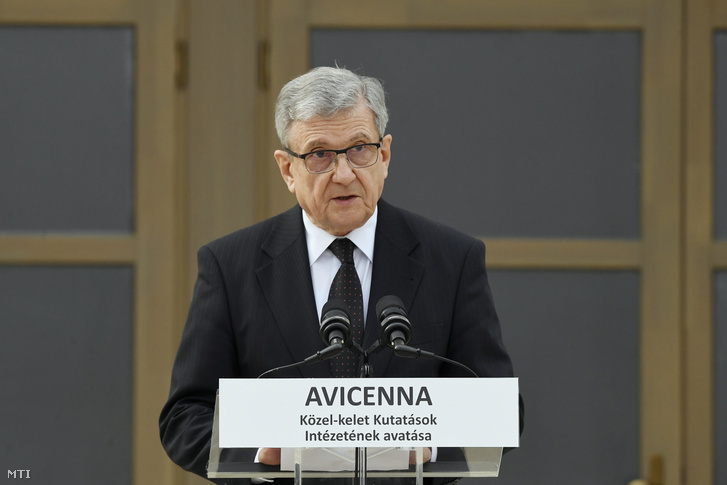
He promised the opposite than what he was tasked with
In the run-up to the Academy's 2014 president election, Maróth hoped to win the office, but the large majority of the Academy's general assembly voted for mathematician László Lovász. In the program article detailing his vision for the Academy, he made points that were really far from Palkovics's perspective: "The accusations often made in recent times about the Academy being a Stalinist formation are unacceptable today," he wrote, emphasising that changes to the Academy's structure can only be made "based on the experiences of those participating in the process, with taking their suggestions into account," and that the "continuous corrections must not entail big shocks and reforms that fill the employees of the Academy with existential doubt, turning their attention away from productive work."
It was not only the violent reforms he rejected back then, but - unlike the Minister - he favoured fundamental research over applied sciences:
"Sadly, the world of politics still expects instantly usable practical results from science, and as such, from the institutes of the Academy as well. Successful research must favour long-term thinking over the utilitarian approach of politics, and long-term planning must prevail in the Academy's activities as well."
He lost the Academy's presidential election then, but now he will lead the institutes that were taken away from the Academy against the will of those affected, throughout which process he was already the scientific advisor of the Prime Minister. Earlier Maróth had been the vice-president of the Academy, but for him, that position was mostly decorative, he was not particularly active in that office. Our sources told us that he was rather isolated within the Academy, despite his good political connections that provided him with great informal power.
"Professor Maróth," as they call him on the political right, is considered a well-respected conservative professor by politicians, and scientists consider him a politician well-connected in science, who has a close personal relationship with Viktor Orbán. This relationship most likely got its start in the mid-90s, when Maróth, as a university dean, invited the young Orbán to the Pázmány Péter Catholic University to speak in front of hundreds of students (despite university regulations expressly forbidding that). Maróth greatly helped Orbán's acceptance in the circles of Christian-conservative intellectuals.
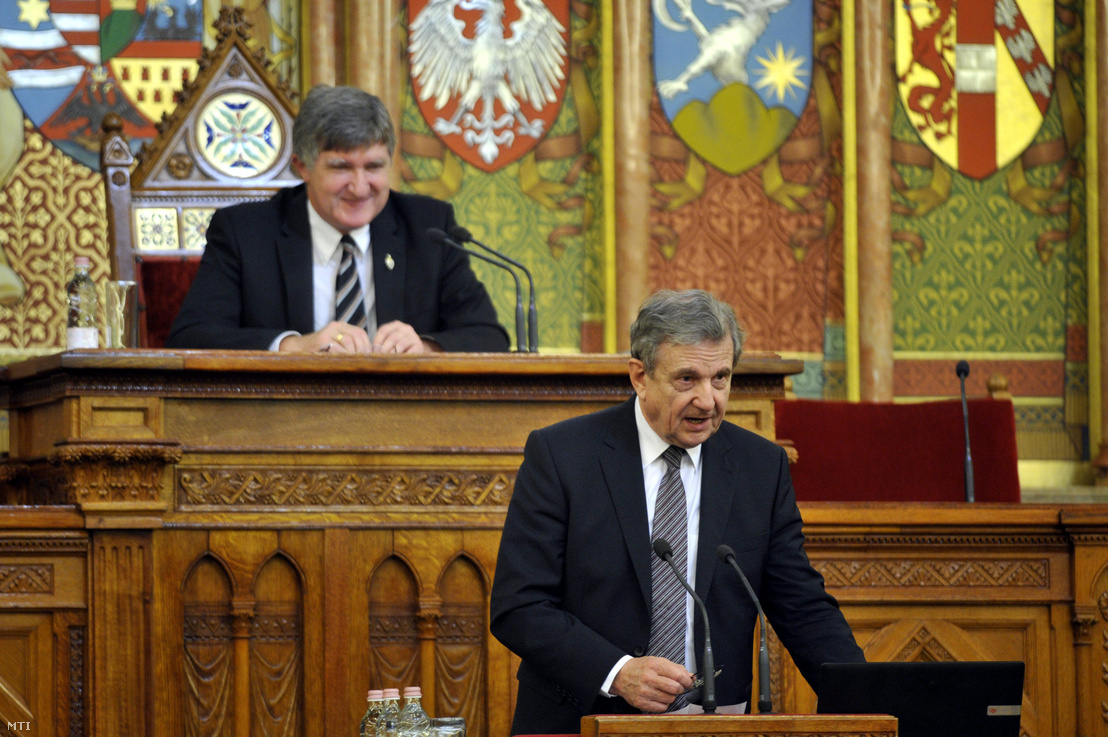
Party interpreter during the socialist era
Despite gaining his reputation as one of the founding fathers of the catholic university, he was active long before Hungary's democratic transition. Besides his academic career, he is known to have had jobs requiring trust during the era of the socialist single-party state. Due to his good grip on languages, he attended several meetings of high-ranking foreign affairs officials with Palestinian and Arabic leaders.
For instance, in February 1984, Maróth escorted the Palestinian delegation everywhere from the Museum of the Workers' Movement all the way to the socialist party elite. The delegation consisted of members of the Popular Front for the Liberation of Palestine, a group (supported at the time by the Hungarian Government) which was responsible for several international terror attacks. Their Hungarian contact was the same Solidarity Committee that was responsible for keeping in touch with similar organisations, often acting as a cover for transporting secret weapon supplies.
People in Maróth's environment considered him to be the communist party's Middle-East expert, but there is no evidence for this, just like there is no proof for the rumours tying Maróth to the secret services:
There is no mention of Maróth's name anywhere in the state security archives, though, given his career, it would not at all be surprising for him to appear in reports written by others.
Responding to our question, Maróth admitted to having worked as an interpreter for various social and state organisations, "however, my relationship with them was strictly business-only. I have never done political analysis or given expert advice, or performed any similar tasks for them, they never asked me to do such things and I wouldn't have accepted these tasks even if they did. I would not have had access to the necessary resources, as opposed to the people working in these organisations."
The former student of a prestigious catholic high school finished his degree in Arabic, Greek, and Latin studies and Assyriology at the Eötvös Loránd University while spending a year in Iraq on a scholarship. His Baghdad professors remembered him as a particularly talented and diligent student who always had on-point questions. Maróth once sued a paper to include in their article that this was nothing exceptional at the time, as then, all students of the Arabic department had spent at least a year abroad.
An intelligent Machiavellian
It is no question that Miklós Maróth is a well-respected scientist with a significant international reputation; none of the people we spoke to disputed that Maróth is a smart man with great knowledge. "He has an international scientific career that is pretty difficult to argue with. His international standards stem from inner motivation, it is no coincidence that he even researched at Harvard," Sayfo Omar, researching the Middle-East at the Utrecht University, told us about Maróth's academic achievements. Maróth's several peers emphasised to Index that Maróth has an impressive body of work and that he has always been a laborious man.
"It's not as if they are appointing a housekeeper, as it happened with Chair of the Institute for Hungarian Studies."
This source told us that while he respects Maróth's achievements, he would prefer to remain anonymous as he fears Maróth's informal power - like many other researchers we interviewed for this article.
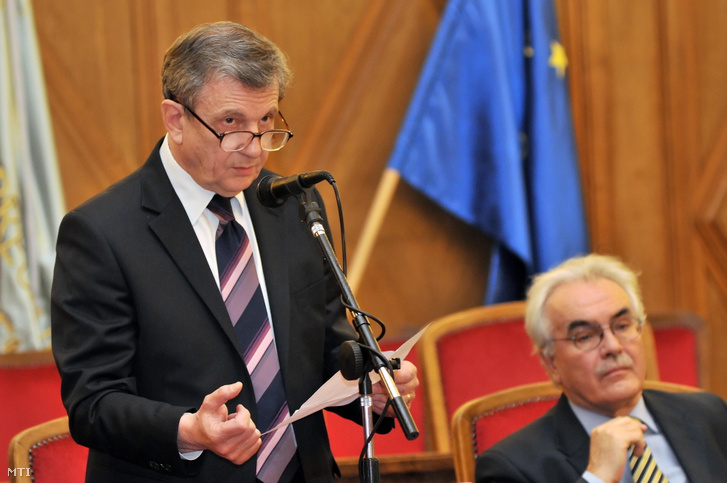
A returning element of how our sources described Maróth is that he is an old-school professor type who never fails to appear in a proper suit, complete with a tie, as "one of the last people embodying the ideal of the conservative professor," who has good diplomatic skills and never stops working.
"He is a highly intelligent, but an exceedingly Machiavellian figure. He treated people like chess pieces all throughout his life, always pulling strings from the background."
Maróth researches a narrow field which only a handful of other people study, his main expertise is the heritage of the late antiquity in the Arabic world. "He always navigated scientific cliques well: he was the best philosopher amongst Arabists, and the best Arabist amongst philosophers, always filling the role of the smartest person in the room from the other side," said his former colleague who now leads a university.
Many did not like how Maróth expands to areas outside of his expertise, for instance, he wrote about the history of philosophy with no formal training on the topic. Logic historian András Máté opined that Maróth is "actually tone-deaf when it comes to the history of philosophy, he calls Platon liberal which is wholly ahistorical. He received a rather dogmatic upbringing, he views philosophy not through the disputes, but through proclamations of the masters."
The man who sought scientific truth at the court of law
Maróth was toughly criticized by his peers, which, sadly, resulted in lawsuits. Philosopher István Bodnár attached a list of errors to half a chapter of Maróth's doctorate thesis, and also wrote a long review for the foreign publication of Maróth's dissertation. György Tatár wrote a particularly harsh review about a book containing works from Yehudah Halevi, as translated and annotated by Miklós Maróth, which he concluded with this: "We cannot really answer the question how a professional, grown-up scientist can make completely unfounded, made-up statements (...) for the Jewish, it's a scandal, for the Greeks, it's madness."
Maróth responded to the criticism, albeit not in a professional setting: He sued political weekly Magyar Narancs that covered the story. Maróth ended up winning the lawsuit, so the newspaper had to issue a correction saying that the dissertation was indeed not full of factual errors. Bodnár still thinks that handling that situation in this manner is unacceptable. As he told Index:
"It is really worrying that such a person, who wants his truth to be coerced by the state instead of defending it in the scientific community, can get into position."
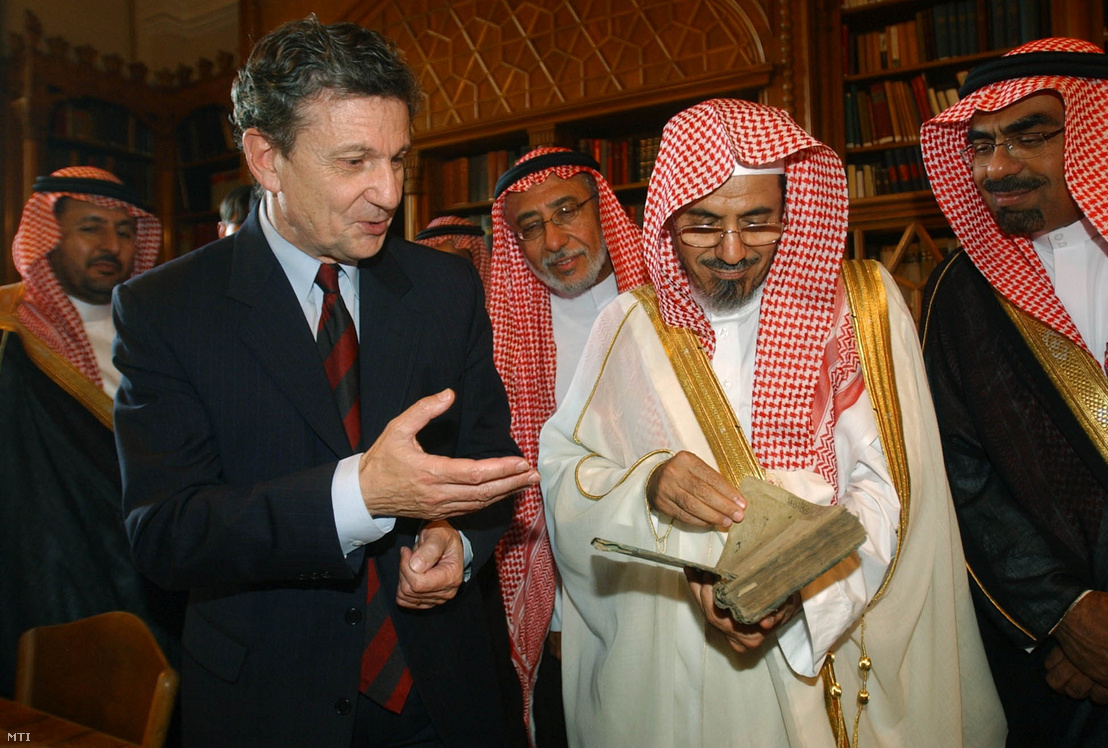
The background man
The informal power possessed by Maróth was always greater than that of the positions he actually held (besides his various roles at the Academy and at research institutes, he used to be the President of the Union Académique Internationale, and he is still the chairman of the Hungarian Higher-Education Accreditation Committee's Supervisory Board). His decades-long influence over scholarships, grants, academic nominations, and distribution of funds is proverbial, and in terms of nominations, he is prone to take risks at others' expense in order to assess his positions in Hungarian scientific life.
His aversion towards CEU was well publicised.
As the committee chairman of the Hungarian Academy of Sciences, he prevented the creation of the greek research centre that was to be a cooperation between Hungarian universities and CEU. This project was about to receive significant funding from Greece. CEU still took on the project under the name "Eastern Mediterranean Centre" by itself, however, this robbed the Hungarian Eötvös Loránd University of a really good opportunity, as CEU professor István Perczel told us.
Against Antall and Péter Erdő
The strong feelings against the liberal elite were already a factor at the founding of the Pázmány Péter University at the beginning of the 90s. As he himself had said, Maróth had been laying down the university's groundworks since 1988. He forced others in the Catholic University Foundation in the background and started the university when the foundation itself was already presented as a one-man-show. Maróth used his political connections wisely, he pulled the strings navigating the resistance of then-PM József Antall and the carefulness of the episcopate effectively, despite clerics being wary of him - he was perceived to be a part of the regime before 1990.
It is typical of Maróth's worldview what he said in an interview in 1994 when he said the Eötvös Loránd University is too democratic, and systems with strong hierarchy are always more effective - he emphasised the serious attitudes and duty-centred ethics of schools operated by the church. Based on his experiences as a student, he wanted to create the higher education equivalent of his catholic high school, Pannonhalma. Maróth was set on establishing elitist, catholic university education outside of the 'sinful city,' thus creating a Christian conservative counter-elite, mostly in opposition to CEU.
He managed to get the university built in Piliscsaba, a small town outside Budapest, despite the objections of the heads of the church.
He did not really coordinate on the details of the development, and the church, in charge of operating the university, had decided to let it slide instead of creating a scandal, by this time, Maróth's political influence was considerable. This is the origin of the bad blood between Maróth and Archbishop Péter Erdő. Maróth wanted the university's leadership to be independent of the church, while, according to his former colleagues, he kept the university on a short leash. He was known to be a tough leader as a dean, who was feared and respected by students and colleagues alike. His staff policy was hectic, as his former colleagues remembered, Maróth always had favourites whom he oftentimes dropped and made a scapegoat. The wanton decisions drove professors and heads of departments to write a petition to the episcopate, which Maróth considered to be mutiny. In 1998, what Maróth worried about happened: Péter Erdő became the rector of the Pázmány University, and Maróth's stint as dean of the Humanities Faculty was cut short.
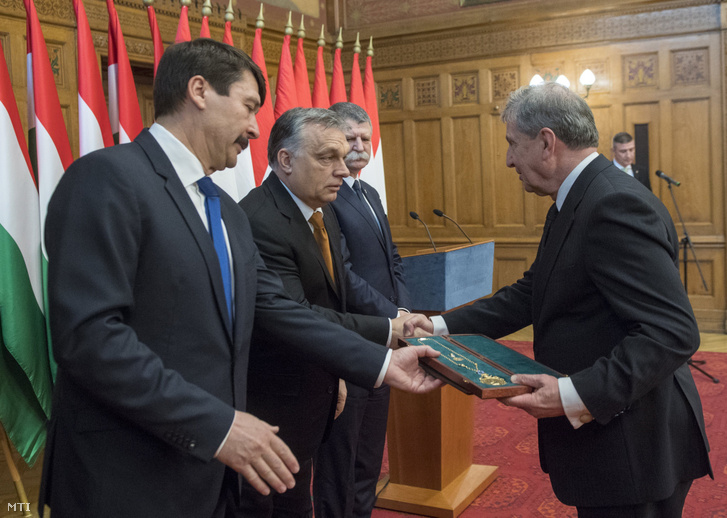
Piliscsaba 2.0
Looking back at it, Pázmány University's Piliscsaba campus was an endeavour that seems to have been doomed to fail right from the start. "The Piliscsaba campus is completely unsustainable, the buildings are unfit for university usage, and it lacks any and all amenities that would be necessary for an out-of-the-city university centre" - a former university leader told us. Maróth was furious that his project was mocked behind his back as the "Catholic Disneyland," but the Humanities Faculty has all but moved into Budapest since then. The Piliscsaba campus remains mostly unused, but maintaining it could still cost close to 200 million Forints every year. This presents the university and the Catholic Church operating the complex designed by architect Imre Makovecz with a major problem, and many still hold Maróth responsible.
Maróth might have left the university, but he still has close ties to Piliscsaba. The Hungarian government awarded 1.3 billion Forints to Avicenna Middle-East Studies Research Institute, founded and ran by Maróth, to construct a building for themselves, the new offices of the institute were then inaugurated by Viktor Orbán himself this April. As Avicenna is a research institute, it is somewhat surprising that Avicenna Kft. was commissioned to build a museum for showcasing Imre Makovecz's work, and that they will be handling outside storage duties for the National Széchényi Library.
All of this becomes more understandable once the Maróth family's close personal relationship with Viktor Orbán is taken into account. Miklós Maróth is not the first member of the Maróth family to work as a government advisor, his son, Gáspár also did that in the early 2000s. Currently, he is the government commissioner of military acquisitions, and though he is involved in a cartel-case currently under investigation by the Competition Authority, he is a key player in the Hungarian military's purchases of US equipment which strengthens US-Hungarian diplomatic relations and helps quell the US criticism of the Hungarian democratic system.
Arabist becomes an anti-muslim talking head
After 2015, Miklós Maróth took the anti-migrant propaganda of Fidesz and ran with it, regularly appearing in the media to voice his opinion that oftentimes coincides with that of Orbán. Many of his comments reverberated across the Hungarian press, most notably his suggestion to dress Muslim immigrants in pigskin. Maróth says integrating immigrants coming from Muslim countries is impossible, and Europe's problem is its excessive tolerance, and that most immigrants end up working at kebab shops. His anti-migrant rhetorics mostly conflate real issues and government talking points, and he sometimes uses fake news to illustrate his point, like when he claimed that a French court acquitted a Muslim rapist saying he did not commit a crime because raping is a "part of his culture." In fact, this was a hoax decontextualising and turning a real piece of news on its head, spread by fake news websites.
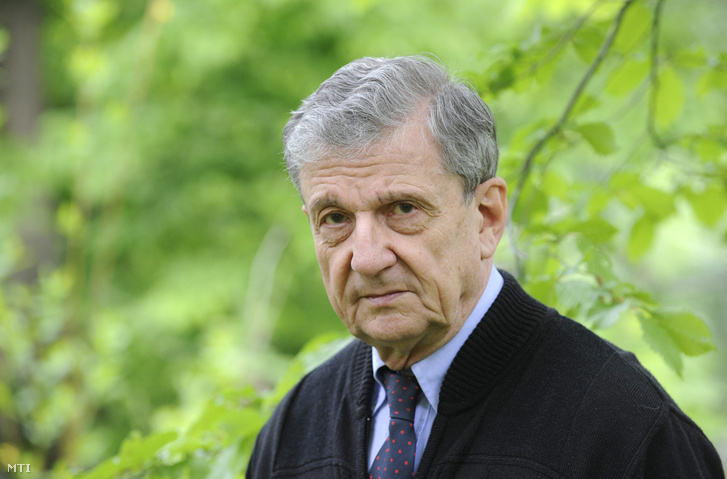
The government happily made use of Maróth, as their media could get statements aligning with Fidesz's own propaganda from a well-known Arabist, and the role of the anti-muslim talking head does not seem to be below the classical philologist. But Maróth does not know much about the modern Arab world, migration studies, or international relations.
Other researchers of Islam criticised Maróth saying that as an orientalist, he should rather alleviate the fears of the majority by relaying actual knowledge, instead of amplifying these fears. Omar Sayfo said Maróth's perspective on migration is best explained by the different approach to orientalism: on the West, the discipline has a sociological approach, while Hungarian Islamic studies mostly focus on examining classical texts and the interpretation of current social and political events happens through that lens. These different approaches yield entirely different answers to the same questions such as what is happening in French banlieues or on the battlefields of Syria. The Utrecht researcher says it is no question that Maróth does not look down upon the Arab world, and he is not racist, Sayfo says that if he is presented as such, that is more attributable to the peculiarities of the media.
He finally did it
This spring, Maróth invited the members of the department of the Academy that he was leading to the Avicenna Institute in Piliscsaba. As one of the participants told Index, he wanted to "boast a little bit to the members of the Academy about his government-sponsored research institute. 'Well, well, you see, I could do it.' In the current state of Hungarian science, reminiscent of a civil war, that was rather bizarre." By this point, Maróth was already on the Academy's performance assessment board representing the government, and as of April, with his appointment as Viktor Orbán's scientific advisor, his informal powers became formalised. Maróth's allegiances were no longer a question for the academics who were worried about the future of the Academy's research institutes.
After Maróth failed to win the presidency of the Hungarian Academy of Sciences in 2014, press information suggested that his name seriously came up in 2016 as a possible candidate to be the next President of the Republic, however, Orbán decided to go with János Áder once more. In the meantime, Maróth received the most significant Hungarian state recognitions - the Széchenyi award, the Corvin chain, but according to those who know Maróth personally, he really wanted to crown his career with a truly significant position.
As the government is twisting the research institutes out from the hands of the Academy, Maróth, at the age of 76, seems to have finally achieved what he wanted.
Maróth: It's not true that I'm highly influential
Before publishing our article, we sent our questions to Miklós Maróth. Besides the answers, he also sent the following response to our piece as a whole:
"The first and second halves of the portrait contradict each other. That is understandable, as the laudatory opinions originate from experts, and those condemning me are most likely from offended colleagues.
1. I know it from my colleagues abroad that my work mentioned here is mandatory reading at several German and French universities, and it received a number of positive reviews in international periodicals. According to one of my colleagues, nobody dared to touch the subject for 25 years after my work was published. With this in mind, the bitterness of the people speaking here becomes understandable. They wanted to study greek logics when they were young, but all of them were forced to move over to a different area. Also, I have only cited Arabic and Greek texts in my book, and none of those who made statements here have degrees in Greek or Arabic studies.
Of course the lawsuit about my dissertation did not settle a question of science, as it was a press lawsuit, and the paper received a fine. The "portrait" reminisces about this already settled dispute.
2. The rumours about my state security past are slander, I refuse even their mention. The fact that I never received any sort of state scolarships in those times when others did also proves my word. The statement suggesting I was the Middle-East expert of the Hungarian Socialist Workers' Party is simply a lie.
3. Anonymous comments do not justify a response in the scientific community, but I refuse each and every one of them in a newspaper article about me. It is not true that I have influence over cases concerning the distribution of funds, grants, and scholarships. The most I've ever done is making suggestions to decisionmakers. About my influence over Academy membership nominations, it's enough to say that as far as I can remember, I've had two nominees altogether, neither of whom was actually elected. My opposition to CEU's planned Greek research centre was based on professional arguments and not my worldview. Also, we originally planned to construct Pázmány University's Piliscsaba campus in Budapest, but we could not find a suitable location.
Miklós Maróth"
Our questions, maróth's answers
What's your take on the past year's struggles around the Academy? Do you think it is reasonable to reorganise the research institutes outside the Academy?
I've already said in a recently published interview elsewhere that there were two truths pitted against each other. Today, it does not matter at all what I think about the year behind us. As the President of the Eötvös Loránd Research Network, my job is to solve this situation working together with others on the controlling board. As for research activities, effectiveness and performance are key. Where the institutes themselves belong is secondary, which clearly shows in the European practice as well. In former socialist countries and Austria, the research institutes belong to their respective academies, however, in other countries, such as England, France, Germany, or Italy, they don't.
What was the problem with the way the Academy's research institutes operated? As a member of the performance assessment committee, how do you see the activities of the research institutes?
Your question is based on a misapprehension, I did not participate in the performance assessment of the institutes. I was a government delegate on the Research Network Scientific Presidential Board (KTEB). KTEB merely set the criteria, methods, and the timetable for the assessment. The assessment itself was carried out by extended, independent, outside advisory boards comprising international experts of certain institutes.
This is what you wrote in 2014: Changes to the Academy can only be made "based on the experiences of those participating in the process, taking their suggestions into account," and that the "continuous corrections must not entail big shocks and reforms that fill the employees of the Academy with existential doubt, turning their attention away from productive work." Do you still stand by that? In your opinion, did the recent developments in Hungarian scientific policy go down in line with these thoughts of yours?
I still maintain my 2014 opinion under the same circumstances even today. But the circumstances were not the same last year as they were in 2014. But now, after a solution seems to have settled, there are once again circumstances in which these thoughts are valid. Hopefully, no outside forces wish to disturb the tranquillity that seems to be forming in science. Finally, scientific research can be aided off the battlefield of politics.
In 2014, you were a proponent of foundational research as opposed to applied research. Did your views on that undergo any changes?
My views did not change, but I've already answered those questions for 24.hu and Magyar Hírlap as well.
As the Prime Minister's scientific advisor, what was your advice concerning the Academy's research institutes? Did you share your opinions on the topic with Viktor Orbán even before your formal appointment as an advisor on 1 April?
As a scientific advisor, it is not my job to intervene in the work of the ministries. I do not have to form opinions on matters of day-to-day operation.
Why did you think it was the right thing to do to file a lawsuit about a statement saying your dissertation was full of factual errors? Do you think courts have authority to decide questions of scientific truth?
The court did not adjudicate in matters of science, but in a lawsuit about an article in the press. According to the judgement, Magyar Narancs's article distorted the truth, and had presented the criticism of my dissertation in a false light. This is what the paper had to delete from the online iteration of the article. The review sections of scientific periodicals made their judgement in the matters of science, the opposite judgement than my Hungarian colleagues, and they still could not manage to stomach that.
Do you consider your statements in the media about migrants as a part of your scientific body of work, or have you made those statements as a private individual?
I speak about migration based on my experiences as an Arabist. There is no such discipline in Arabic studies as "migration." My statements were made as a private individual.
Did you really participate in government talks with Middle-Eastern delegations before the democratic transition as an interpreter? Did you translate for János Kádár and other such high-ranking party officials? Did you perform any other tasks on these occasions, such as contributing to foreign policy as an advisor or analyst before 1990? If so, what was the nature of these activities, and what's your opinion about them today, in retrospect?
I have indeed worked as an interpreter for certain social and state organisations in Arabic and Finnish languages. The nature of my relationship to them was strictly business-only, I have never done political analysis or given expert advice, or performed any similar tasks for them, they never asked me to do such things and I wouldn't have accepted these tasks even if they did. I would not have had access to the necessary resources, as opposed to the people working in these organisations.
(Cover: Prime Minister Viktor Orbán (right) and academic Miklós Maróth shaking hands at the opening of Avicenna Middle-East Research Institute's building in Piliscsaba on 9 April 2019. Photo: Szilárd Koszticsák / MTI)
This article is a direct translation of the original piece and the interview published in Hungarian by Index.

Support the independent media!
The English section of Index is financed from donations.


